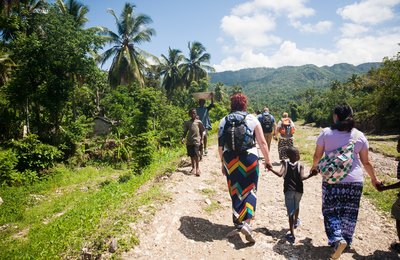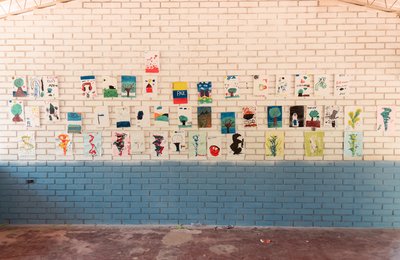The Sierra Leone police have worked with international organisations including the UN. But some people are worried at the prospect of police violence during next year’s polls. Image credit: svbroc.
“I don’t have trust in the police anymore. If these sorts of things continue to happen, peace will suffer"
“My brother was shot at close range. That was why the bullet did not stay in his head. I have frequent nightmares, about how he was brutally murdered in cold blood. I can hear the gunshot ringing in my ears like a bell.”Yirah Moseray Thoronka reflects on how he is struggling to cope with the reality of his little brother’s death. He was allegedly shot and killed by the police during a protest last year, in the northern Sierra Leonean town of Kabala. Young people in the town were protesting because the government wanted to move a proposed $200 million World Bank project, to develop a youth village supporting vocational and skills training, to another location.
The project had been allocated but there were suspicions among young people that the money had gone missing, which was why government wanted to relocate the village to another district. The protest that followed claimed two lives and left many injured. The district ground to a halt for two days, and a month-long curfew followed.
Yirah questions the police’s ability to handle civil demonstrations without recourse to violence.
“How do you maintain law and order in a civilised nation? Is it the presence of guns?”
“This is not the first time that police have killed innocent people,” he says. “Nothing seems to come out of the numerous investigations that follow. This leaves frustrated victims and their families without justice.”
“I don’t have trust in the police anymore. If these sorts of things continue to happen, peace will suffer, and the potential for reprisals and conflict will thrive.”
Following the Kabala incident, a press release from the Campaign for Human Rights and Development International (CHRDI), a civil society organisation that works on justice issues in Sierra Leone, said that: “For far too long, there has been double standard in place for police officers involved in incidents of brutality and misconduct. The ease with which police officers use live bullets to disperse unarmed protesters is a very worrying sign for peace and tranquility and the country’s political future.”
Assistant Superintendent Kamara agrees that the police should be on the side of the people
Assistant Superintendent of Police Brima Kamara is head of the Sierra Leone Police’s Media and Public Relations. He denies the allegations, pointing the finger instead at protesters for taking the law into their own hands. He points out that all civil protests must be approved by the police according to the country’s 1965 Public Order Act. The protesters in Kabala, he says, did not follow this procedure, which was why the police had to fire tear gas. In the heat of that moment, Kamara adds, the protesters started throwing stones and other missiles at the police.“It was a matter of self-defence. The police had to protect themselves and unfortunately, two people lost their lives,” Karmara.
It is these sorts of arguments and counter arguments between police, civil society organisations, and ordinary people that beg the question about when armed police officers should pull the trigger.
In the twenty first century, there are alternatives to bullets for crowd control. The Executive Director of the Institute for Governance Reform (IGR) is Andrew Lavali. He says that: “Most of the circumstances leading to the use of live bullets in Sierra Leone over the past years are not warranted; they do not meet the minimum threshold.”
The right to protest is a “constitutional provision that must be respected by law enforcers. Any loss of civilian life in a protest must be thoroughly and speedily investigated and culprits brought to book.”
Lavali says that as monitors of peace and governance in Sierra Leone, they have found that: “Most incidences of shootings and unlawful killings of civilians are not investigated, and [as] such serve as motivation for reoccurrence of the problem.”
Responding, Assistant Superintendent Kamara agrees that the police should be on the side of the people, including those that are not part of any protests.
“Our responsibility is to protect lives and property, and when we realise that these lives and property will come under threat during a proposed protest, we are bound to prevent it” he stresses.
"I have lost total faith in our police"
Parent Wusha Conteh doubts the police’s ability to provide security during the 2018 presidential and parliamentary elections. “They are not on our side as citizens. I have lost total faith in our police. They kill innocent civilians to protect politicians and no punishment is meted out as a deterrent.”However, Kamara holds a contrary view. “Civilians are only interested in the immediate violence, but never have time to follow up on whether police have made arrests and committed anyone to court for prosecution.” On the Kabala incident, he went on, three arrests of protesters were made relating to the shootings, and there are people standing trial for various offences.
Andrew Lavali from the IGR highlights the importance of the upcoming elections.
The worst thing that could happen, he says, “Is for people to have misgivings about the police. The police should know that there are lots of things people are frustrated with in the country.”
Lavali warns that the country is sitting on a time bomb, and so the police should demonstrate great professionalism in responding to civil protests.
Regarding the questions around police neutrality, he says that: “We have realised that one of the things leading to lack of neutrality is the political recruitment of police officers. A police officer recruited on political grounds will express loyalty to their political benefactor instead of the citizens.”
While civil society calls for speedier and more transparent process of investigations, families bury and burn their dead. The police continue to investigate the matter and hope to bring culprits to book.
This article has been updated.
Abdul Brima
is Peace Insight's Local Peacebuilding Expert in Sierra Leone. A radio producer and presenter on BBC Media Action Sierra Leone, he has worked with rural communities on conflict and development issues in Sierra Leone and Liberia.
Read more from Abdul Brima







